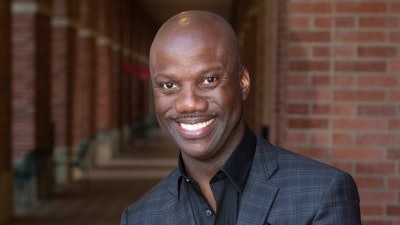Beyoncé has a new song, Break My Soul. As usual, us loyal fans are wild about it. I promise to get to it, but let me first write about three prior experiences in which Beyoncé inspired other Black scholars and me.
The 2016 National Conference on Race and Ethnicity in Higher Education (NCORE) occurred shortly after the release of Lemonade, a visual album by Beyoncé. I was the NCORE opening speaker that year. I framed my keynote entirely on songs and stunning images from Lemonade. Specifically, I used Beyoncé’s lyrics as metaphors for various racialized experiences that many people of color have in the academy. It felt like church with lots of spontaneous shouts, applause eruptions, and arms raised in hallelujah posture as expressions of spiritual resonance. It seemed that most people really loved it. The show I put on at NCORE would not have been possible had it not been for the brilliance of Lemonade’s creator. Dr. Shaun R. Harper
Dr. Shaun R. Harper
Ohio State University Professor Dr. Lori Patton Davis, my best friend, was the first Black woman elected president of the Association for the Study of Higher Education. In her 2018 ASHE Presidential Address, Lori situated Beyoncé as a producer of performative scholarship and as a possibility model for positioning Black women as knowledge holders and academic producers worthy of citation. She also brilliantly used a Beyoncé lyric to advocate for pay equity for Black women in the academy. President Patton Davis notably entered and exited the stage to Apeshit, a Beyoncé and Jay Z song. From start to finish, the entire experience she curated for us also felt like church. Black ASHE members were especially affirmed.
And then there is Homecoming, the unforgettable 2018 Beyoncé Coachella performance that was subsequently released as a Netflix documentary. As explained in my 2019 article, the performance was a powerful tribute to Historically Black Colleges and Universities. This resonated with me for two particular reasons. First, as a proud graduate of Albany State, a public HBCU in Georgia, I appreciated the cultural authenticity of Homecoming. Beyoncé, the musicians, and dancers transported me back to the years I spent on my college drum line. The performance also inspired me as a Black professor. I was mesmerized that Beyoncé went into a mostly white music festival and did what she wanted to do. It was deeply and deliciously Black. It is important to note that she was the first Black woman to headline Coachella. I have been the first Black academic in several spaces, including my decade on the higher education faculty at the University of Pennsylvania. In the most unapologetic way, like Beyoncé, I often show up in the Blackest way possible without care for the whiteness that has and continues to dominate spaces in which I do my work.
Now, on to Break My Soul, the newest Beyoncé single that dropped Tuesday morning. Its clear themes of resistance, resilience, and self-determination are sure to resonate with Black academicians. Unlike Lemonade, which required metaphorical adaptations to the higher education workplace, I see many obvious connections in this newest song.
“And I just quit my job; I’m gonna find new drive; Damn, they work me so damn hard,” are lyrics in the first verse. Many Black scholars leave predominantly white institutions (PWIs) because of the ‘Black Tax’ – the racialized workload disproportionality that requires us, for example, to advise and support high numbers of students of color, serve as token appointees on campus committees, engage in unpaid and unrewarded diversity labor, and write more external review letters for tenure cases than our white colleagues because there are so few tenured Black professors in one’s field to do so. While we care about diversity and students of color, we also care about the scholarly ideas that originally attracted us to academic careers. Thus, some of us leave one place for another with the hope of finding more harmony and balance between our personal and professional missions.





















